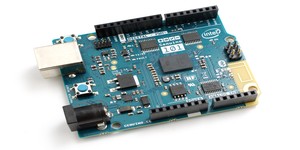Microsoft pushes into IoT with Galileo giveaway
July 9, 2014 | 11:53
Companies: #arduino #arm #galileo #microsoft

Microsoft has launched a programme to push its Windows platform as the next big thing for embedded devices, and is putting its money where its mouth is by giving away Intel's Galileo development platform to interested parties.
Launched earlier this year, the Galileo is the first outing for Intel's Quark processor. A system-on-chip (SoC) design, the Quark is designed to offer an x86 rival to the popular ARM chips currently dominating the embedded space. 32-bit only and based on the Pentium architecture - complete with its infamous F00F bug - the processor offers extremely low power draw combined with the familiarity of the x86 architecture.
Microsoft, meanwhile, has its own reasons for wanting to see Intel capture a bigger chunk of a given market. Its mainstream Windows releases are only available for x86 platforms, with a small number of ARM SoC vendors having been granted licences to sell tablets with Windows RT. If the Intel Galileo and its x86 Quark processor takes off with makers and tinkerers, Microsoft has a chance to get its Windows platform into a whole new market.
As a result, it's perhaps unsurprising to see the company offering to buy Intel Galileo boards for developers interested in building embedded devices - except, that is, for one fact: Windows doesn't run on the Intel Galileo, which uses a custom version of the Linaro Linux distribution. What isn't clear at present is whether the company is planning on releasing a Windows Embedded port for the low-power device or is instead concentrating on its compatibility with Windows-based desktops via USB or network communications.
Either way, the company has promised to launch a software development kit for Windows that supports the Galileo in the near future and is looking for developers. Those accepted to be part of the developer programme, available by signing up on the official website, can expect to receive a Galileo for their trouble.
Launched earlier this year, the Galileo is the first outing for Intel's Quark processor. A system-on-chip (SoC) design, the Quark is designed to offer an x86 rival to the popular ARM chips currently dominating the embedded space. 32-bit only and based on the Pentium architecture - complete with its infamous F00F bug - the processor offers extremely low power draw combined with the familiarity of the x86 architecture.
Microsoft, meanwhile, has its own reasons for wanting to see Intel capture a bigger chunk of a given market. Its mainstream Windows releases are only available for x86 platforms, with a small number of ARM SoC vendors having been granted licences to sell tablets with Windows RT. If the Intel Galileo and its x86 Quark processor takes off with makers and tinkerers, Microsoft has a chance to get its Windows platform into a whole new market.
As a result, it's perhaps unsurprising to see the company offering to buy Intel Galileo boards for developers interested in building embedded devices - except, that is, for one fact: Windows doesn't run on the Intel Galileo, which uses a custom version of the Linaro Linux distribution. What isn't clear at present is whether the company is planning on releasing a Windows Embedded port for the low-power device or is instead concentrating on its compatibility with Windows-based desktops via USB or network communications.
Either way, the company has promised to launch a software development kit for Windows that supports the Galileo in the near future and is looking for developers. Those accepted to be part of the developer programme, available by signing up on the official website, can expect to receive a Galileo for their trouble.

MSI MPG Velox 100R Chassis Review
October 14 2021 | 15:04








Want to comment? Please log in.